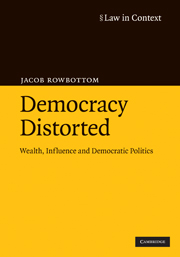Book contents
- Frontmatter
- Contents
- Preface and acknowledgements
- 1 Political equality, wealth and democracy
- 2 Freedom to speak and freedom to spend
- 3 Strategies and reforms
- 4 Access, influence and lobbying
- 5 Beyond equal votes: election campaigns and political parties
- 6 Public spaces, property and participation
- 7 The mass media: democratic dreams and private propagandists
- 8 Participation in the digital era: a new distribution?
- 9 Conclusion
- Index
- References
4 - Access, influence and lobbying
Published online by Cambridge University Press: 05 June 2012
- Frontmatter
- Contents
- Preface and acknowledgements
- 1 Political equality, wealth and democracy
- 2 Freedom to speak and freedom to spend
- 3 Strategies and reforms
- 4 Access, influence and lobbying
- 5 Beyond equal votes: election campaigns and political parties
- 6 Public spaces, property and participation
- 7 The mass media: democratic dreams and private propagandists
- 8 Participation in the digital era: a new distribution?
- 9 Conclusion
- Index
- References
Summary
The chance for people to influence legislative and executive decisions is not limited to elections. At other times people can influence political decisions through contact with a range of officials, in the legislature, executive, or the various administrative and regulatory bodies. Not every person or group can participate equally in the decision-making process. The official taking the decision has considerable freedom to choose which people to meet with and listen to; a choice that gives varying opportunities to different people. Yet such decisions take place within the political framework, either with MPs acting as representatives, or officials performing certain public functions. Given this setting, political equality is important, in so far as the chances to influence the official should not depend on the wealth of the individual or group in involved. However, there are a number of ways that inequalities in wealth can impact upon the decision-making process, the most obvious being corrupt payments to officials to secure a benefit or favourable treatment. Aside from corrupt payments, more common ways to influence ministers, MPs or civil servants include lobbying, which is sometimes associated with techniques that appear to give privileged access to those willing to pay.
A number of factors have led to the growth of lobbying as a professional activity. Constitutional changes mean there are more points of entry for lobbyists. The devolved assemblies, as well as the institutions of the EU, provide targets for those seeking to influence policy beyond Westminster and Whitehall.
- Type
- Chapter
- Information
- Democracy DistortedWealth, Influence and Democratic Politics, pp. 78 - 111Publisher: Cambridge University PressPrint publication year: 2010



